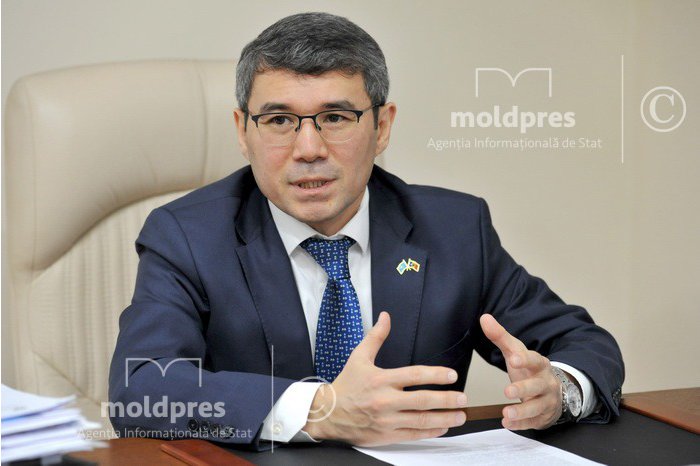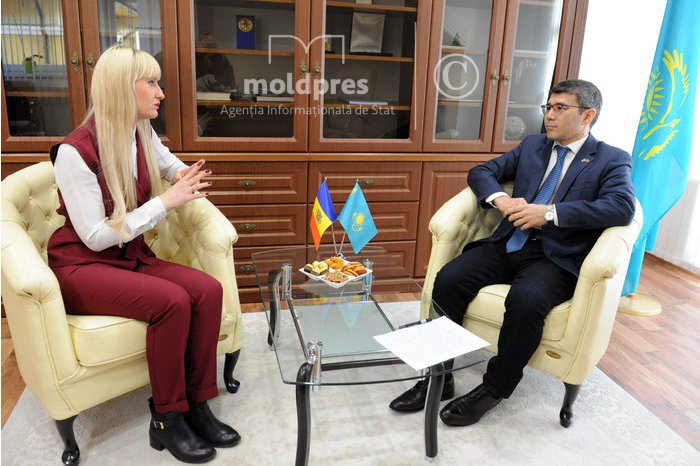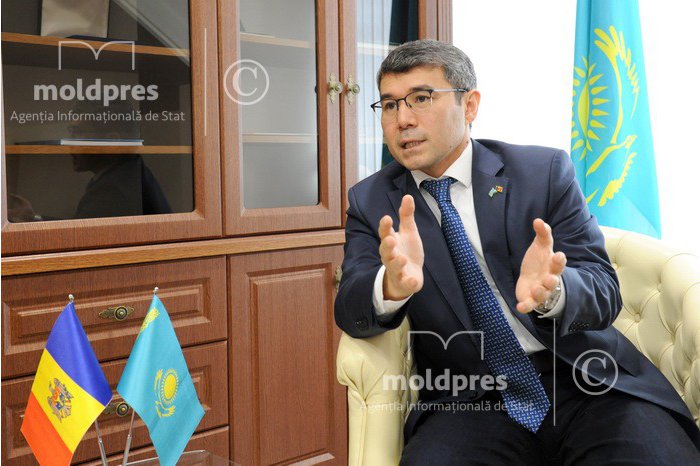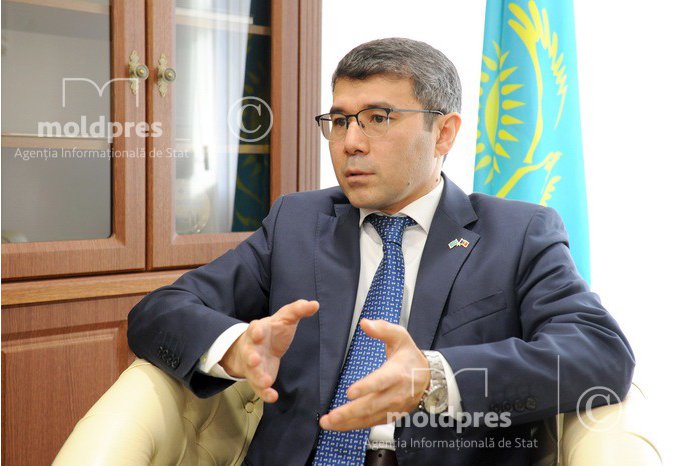Kazakh Ambassador says Moldova important partner for Kazakhstan, willing to continue developing bilateral relations
19:28 | 26.12.2022 Category: Interview, Event
Ambassador of Kazakhstan to Moldova, Almat Aydarbekov has given an interview exclusively with the MOLDPRES State News Agency on topical subjects, bilateral relations and projects carried out in Moldova.
MOLDPRES: This year, we mark the 30th anniversary of the establishment of the diplomatic relations between Moldova and Kazakhstan. How do you assess the cooperation between the two countries, proceeding from the perspective of Moldova’s transition from an independent state to a country candidate for EU integration?
Almat Aydarbekov: The bilateral relations between Kazakhstan and Moldova are friendly and quite strong. We are interested in the further development of our cooperation. During these 30 years, we have gained a rich experience in our diplomatic relations; yet, the potential is far from being exhausted. Presently, the international environment is difficult. On this period, both Kazakhstan and Moldova, just as other countries, pay special attention to the bilateral relations.
In December 2015, the European Union and Kazakhstan signed the Enhanced Partnership and Cooperation Agreements (EPCA). This new agreement, which is the first one of this kind signed by EU and a partner from Central Asia, leads the cooperation between EU and Kazakhstan to a new level.
Taking advantage of this occasion, I would like also to congratulate Moldova and its citizens on the getting of the status of country candidate for integration into EU. Most European Union countries, as well as Moldova are our principal partners from the commercial, economic and investment viewpoints. As the world struggles to cope with the challenges triggered by the present geopolitical and economic difficulties, a close relation between Kazakhstan and Moldova is essential.
The decision by President of Kazakhstan Kassym-Jomart Tokayev to open an Embassy in Moldova proves the special importance of the relations with Moldova. Our countries have close relations both from the political viewpoint and from the commercial and economic points of view. We are set to develop, in continuation, a high level of relations and the mutual support on the international platforms.
MOLDPRES: The bilateral trade in 2021 was of about 40 million dollars. What Moldovan goods are presently the most competitive ones on the market of Kazakhstan and in which conditions the export quotas can be increased?
Almat Aydarbekov: The commercial and economic relations between our countries have a big potential, significantly exceeding the current volume of the turnover from the foreign bilateral commerce. Therefore, we now work, in order to fully use this potential. Presently, measures are undertaken for activating the Kazakh-Moldovan Intergovernmental Commission for Economic Cooperation. The fifth meeting of the Commission took place took place in Chisinau in 2015; seven years have passed. The next step is the organization of the business forum within the Commission, in which both the state’s relevant organizations and the business environment will participate.
At present, we have meetings both with representatives of state bodies and representatives of the public sector and businesses. We also work to identify joint points, fields for the further development of the bilateral cooperation. Presently, the usual logistic channels for the export and import of goods were disturbed; nevertheless, Kazakhstan, along with the partners interested, actively works on the project, Trans-Caspian International Transport Route (TITR). This route should allow extending the opportunities and ensure the development of the bilateral trade with Moldova.
Kazakhstan has not enforced any quota for the Moldovan economic agents. Besides, through the export of products to our country, Moldovan producers can tap the markets from the Central Asia, China and other countries of the Commonwealth of Independent States (CIS). If we speak about products, then the most competitive are the ones from the agro-industrial sector. We mean the dairy products, juices and, certainly, wines. These products are of quite high quality and are competitive on our market.
MOLDPRES: During a meeting between you and Prime Minister Natalia Gavrilita, you discussed a possible boosting of the partnerships in the agricultural and energy sectors. What actions, fields of investment we can focus on?
Almat Aydarbekov: In those eight months of mandate, I have had a string of official meetings, during which we discussed up-to-date subjects in our relations. As for the energy sector, the Kazakh Company Rompetrol, which has been working in Moldova for 20 years, is presently involved in the delivery of crude oil at the state level. We also discussed the purchasing of fertilizers from Kazakhstan. We referred also to subjects in 0the transports’ sector. Thus, Kazakhstan participates in the modernization of the railways in Moldova, carrying out the segment Tighina – Basarabeasca – Giurgiulesti. With the beginning of the works, 60 Moldovan citizens were involved in the project. We are permanently in touch with the Infrastructure and Regional Development Ministry, in order to monitor the evolution of the works. It is quite important for us that the works are carried out in time and are of high quality.
Besides, Moldova imported 12 locomotives from Kazakhstan, made by General Electric, which got a positive feedback on behalf of specialists. We hope that this cooperation will continue and Kazakhstan will be able to contribute to the development of infrastructure projects.
MOLDPRES: Moldova received a large number of refugees following the war in Ukraine. And Kazakhstan faced a similar practice. What exchange of positive experience can be between our states in this respect?
Almat Aydarbekov: Each year, the problem of refugees acquires a new sense and can appear spontaneously. I believe that both Moldova and Kazakhstan managed to cope with the challenges and to solve the problems emerged. Your country received over 400,000 refugees; they say not in vain that Moldova is a small country with a great heart; I would say that Moldova has a quite great heart.
The Digital Kazakhstan - Unified Management programme was developed in Kazakhstan. It includes more innovations, among which there is also the use of an individual identification number (IIN), which is issued to a person who arrives in the country. Based on this number, a foreign citizen can receive all documents needed, including through an electronic application – online. Thus, people are served in automated way due to this innovation. In this respect, we might cooperate and exchange experience.
MOLDPRES: What changes have taken place in Kazakhstan in 2022; what difficulties you country faced on this period?
Almat Aydarbekov: The world went through more ordeals this year. The consequences of the current events hit our economy and the risks of a global recession and of the increasing inflation undermine the trust of the enterprises in the region.
Against this background, following the well-known events from last January, when we faced an attempt of coup d’etat with the use of armed violence, many people were not sure that Kazakhstan would be able to recover. Yet, as the end of this year is nearing, we can say with confidence that Kazakhstan has maintained its position, proving resistance and stability; we transformed out country through significant political, social and economic initiatives.
After the nationwide referendum from last June, we carried out constitutional reforms, which include the limiting of the president’s powers, consolidation of the parliament’s role, an independent Constitutional Court, creation of new political parties, direct elections of akims (governors) and other important measures.
In last November, presidential elections took place in our country, in accordance with the new Constitution, which means that all future heads of state of Kazakhstan, including the current president, K. Tokayev, will have one mandate with no right to be reelected.
As for the international events, in last October, our country hosted the sixth Summit of the Conference on Interaction and Confidence Building Measures in Asia – an organization which we founded 30 years ago, in order to consolidate the cooperation for peace, security and stability in Asia. In the same month, a meeting of the heads of state from Central Asia took place in Astana, with the participation of European Council President Charles Michel.
On month earlier, the seventh Congress of the Leaders of the World and Traditional Religions was held, where Head of the Catholic Church, Pope Francis was present among over 100 delegates from 50 countries. On the same period, we hosted Chinese President Xi Jinping, whose state visit to Kazakhstan was the first trip abroad following the Covid -19 pandemic.
Thus, we laid a solid foundation for the further development of the relations with our international partners, including Moldova.
MOLDPRES: More than 20,000 ethnic Moldovans live in Kazakhstan. What opportunities of education and work they have? Which is the difference between the life in Moldova and the one from Kazakhstan?
Almat Aydarbekov: Both Kazakhstan and Moldova are multinational countries. More than 130 inter-ethnic groups live in Kazakhstan, including Moldovans. In our country, all citizens, no matter the nationality, have the same rights and opportunities. Besides the basic rights, they have possibility to learn their origin language, the culture and values of their people.
In 1995, the Assembly of People of Kazakhstan was set up, uniting the interests of all ethnic groups, ensuring the observance of the citizens’ rights and freedoms, no matter their nationality.
Also, Moldovans occupied a worthy place in the diversity of ethnic groups from Kazakhstan and actively participate in the public and cultural life. For instance, the Dacia Moldovan-Romanian cultural society was founded in Karaganda and in 2006 - the public association, Struguras Moldovan Cultural Centre from Almaty. Both cultural centres are members of the Assembly of People of Kazakhstan, as well as active participants in republican, regional and city events, organize diverse cultural events for the preserving of the national identity of the Moldovan Diaspora, contributes to the improvement of the inter-ethnic relations and to the strengthening of the friendship between peoples. At the same time, the Moldovans from Kazakhstan have possibility to study in Romania, as good relations with Romania’s Embassy in Kazakhstan were established.
On 19-20 August, this year, the Moldovan Diaspora’s Days were held in Chisinau. Among the guests, there was also the Kazakh delegation led by the head of the Dacia Moldovan-Romanian cultural society from Karaganda, N. Plushkis. The performance of the Kazakh delegation with the singing of Kazakh and Moldovan songs aroused a positive reaction among the guests and participants in this Forum.
Our nations are quite close, multinational, tolerant and quite hospitable. I feel very good in Moldova, I like Chisinau very much – a green city where the people have an active lifestyle. At the same time, the Moldovans are quite hospitable and friendly. I started learning also the Romanian language, which I like very much, it is a melodious language.
MOLDPRES: As diplomat, what professional experience you have got for the first time in Moldova?
Almat Aydarbekov: For me, Moldova is a unique country. As I have seen, the young people have a proper education and actively represent their country internationally with enthusiasm. They are quite open for innovation, new projects, which shows a huge potential. The local political environment is also quite open and in continuous evolution.
Taking advantage of this occasion, I want to congratulate all Moldova’s citizens on the New Year, which is nearing, and to wish them peace and prosperity.
MOLDPRES: Mr. Ambassador Almat Aydarbekov, thank you for the kindness to give this interview with our agency.




